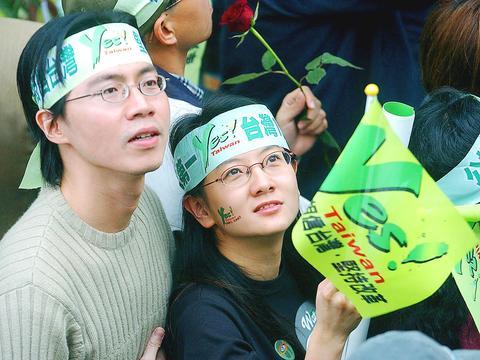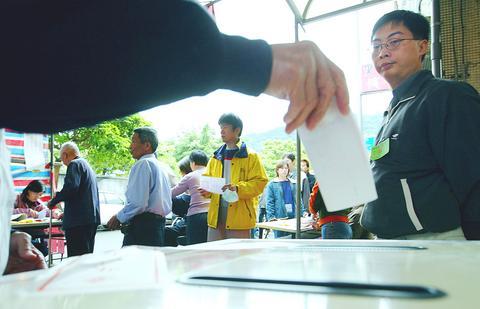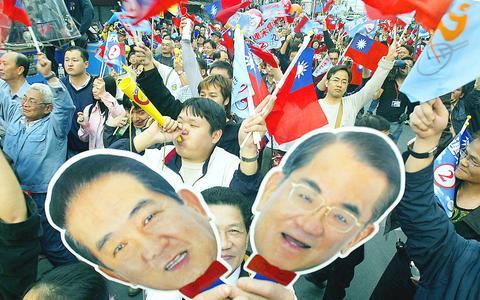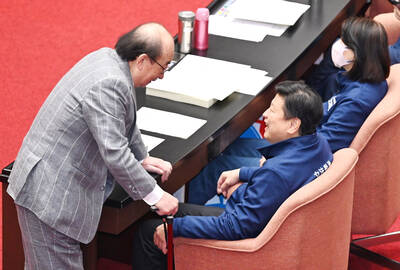Taichung, 8:05am

PHOTO: AP
Finishing their morning exercises in Yingtsai Park, a group of elderly women swung their arms and chattered excitedly, looking not unlike a gaggle of geese in their black and white exercise uniforms.

PHOTO: REUTERS
On a normal day, the group would part company after their morning meeting, but this day they finished off with one last exercise: voting. A community center in the corner of the park had been converted into a polling station. Police officers had just opened the doors and perched themselves on plastic stools outside. They were there to guard the ballot boxes and keep the peace following one of the least peaceful days in Taiwan's history.
But although Friday was a fireworks frenzy of campaigning that climaxed in an attempt on the president's life, the polls were relatively quiet on election day. The shouting match had fallen silent. The only commotion here was coming from the group of women making their way through the park to the community center, swinging their arms and scaring birds out of sakura trees.

PHOTO: AFP
Perhaps it was quiet because this area in the heart of Taichung City leans heavily toward the Chinese Nationalist Party (KMT) and it's candidate, Lien Chan (連戰).
You could almost figure the demographics yourself watching people as they lined up to vote. The group of a dozen uniformed ladies joined the line and one by one disappeared behind the white curtains. A few of them, though, lingered in the courtyard before getting in line.
"They can go first," said Wang Pei-juan (王珮娟) as she chatted with three other women. The reason became apparent when the first set of women was seen casting their presidential ballots and immediately exiting the polling station. Wang and her smaller clique cast their presidential ballots, then disappeared behind a second set of curtains to vote in the nation's first referendum, which the incumbent candidate, President Chen Shui-bian (陳水扁) has strongly promoted and the opposition has boycotted.
"It's unfair that the [Central Election Commission] has demanded that the ballots be separated," Wang later said. "They say it will prevent many problems, but it creates other problems." She explained that many households were as divided as the nation itself and to have to go behind curtains twice made a person's choices less than secret.
Her fears may have been unfounded. Another woman coming out of the polling station later in the morning, Jenny Hsieh, said that even though she voted for Lien, she cast her vote in the referendum, too. This was the first election the 30-something bar owner had ever voted in -- the first one she was able to vote, having come from China 10 years ago.
"I voted in the referendum because I could," she said, without revealing how she answered the two questions. And what did she think of Taiwan's heated democracy and Friday's assassination attempt?
"They missed," she said.
Xinchang Borough, Hsichih, Taipei County, 10:30am
Under a dreary, dark sky and slight drizzle, voters of the Xinchang Borough in the Taipei satellite city of Hsichih yesterday morning were greeting neighbors and lining up to vote as they filed into the local Land God temple, which had been converted into a polling station. Some dutifully stopped to make three bows as they passed the altar before joining the short queue, though most made quick work of voting and left within minutes.
Andy Chen, a 30-year-old biotech engineer and lifelong resident of the neighborhood, was one of the few who lingered at the temple, watching the small crowd intently. His wife was a volunteer in the voting station and he'd come to check on her safety, feeling some concern over possible violence after Friday's assassination attempt on the president. In 2000 he voted for Chen, he said, but this time around had cast his ballot for the Lien Chan and James Soong (宋楚瑜) ticket, disappointed by what he called the incompetence of the DPP administration. He had little patience, however, with the extremism that had arisen during the bitterly fought campaign on both sides.
"I don't really think anything will happen here, but then I didn't think anyone would shoot the president. I was a bit worried that people would be overly excited," he said.
Here, voters were patting each other on the back to say good morning and rushing to assist an elderly couple trying to make it up the three steps to the voting station.
The drama of the attempt on the president's life that monopolized air time on TV Friday seemed already worlds away both from people's minds and their conversations.
At the temple, the three unarmed policemen stationed there to guard the ballot box chatted casually while sipping tea and passing around Long Life cigarettes. If the possibility of a disruption was on their minds, they weren't showing it. When the outside chance of someone going berserk at the polling station was raised, one joked and pointed over his shoulder at the shrine: "No way. Not here. The gods are
watching."
Perhaps, but Andy Chen was taking no chances. "The president getting shot might give people pause to think rationally about politics in Taiwan. But, it might also trigger more emotions," he said.
Renai Elementary School, Dunhuang Borough, Taipei City, 3:45pm
At Dunhuang Borough's Renai Elementary School located along an upscale stretch of Anhe Road in downtown Taipei, election day progressed along the lines of any typical Saturday: the neighborhood kids jammed the schoolyard for games of basketball and soccer, while parents stopped by to step into one of the two classrooms that had become polling stations for the day.
Other young and trendily dressed borough residents double-parked their Mercedes and SUVs outside the school's gates, rushing into the voting booths with cellphones pressed to their ears.
With a jovial smile beaming from under a Taipei City Mayor Ma Ying-jeou (馬英九) campaign baseball cap, 80-year-old Wang Fang-ting (王方廷), took in the hectic to and fro sitting by the entrance to the school. Clearly a popular character in the neighborhood, voters stopped to shake his hand and wish him well while he bent over to say "hi" to kids in his thick Shandong accent and russle their hair.
Having fought in the Chinese Civil War and followed Chiang Kai-shek (蔣介石) to Taiwan in 1949, he was unfazed by the excitement of the election. He voted for the pan-blues, but admitted to doing so mostly out of habit.
"Ah, whoever wins it'll all be the same. All that matters is that the country is stable," he said. "I heard people saying they wish the assassination attempt had succeeded, and others saying that it was all staged. But that's not a very constructive thing to say."
As the voting stations prepared to close, the crowds thinned out and the kids continued their games on the playground.
Meanwhile, the nation's voters went home to watch TV and bite their nails as the results in the close race poured in from around the country.
Tainan, 5pm
The polls closed an hour ago, the ballot boxes had been sealed and counting had begun. It was hard to find any shopkeepers who were keeping shop. Every pair of eyes was glued on the television, watching the ballot count climb. A dozen youths sat silently at a noodle stand. Minutes crawled by and noodles, untouched, got cold. The owner, surnamed Chiang, was the most nervous of all. He got up to change the channel and, not liking what he saw, changed it back.
"A-Bian is in the lead," he said, "He has 4.7 million to Lien's 4.3 million." His daughter grabbed the remote control and switched it back.
"He has 5 million votes to Lien's 5.3 million. He's losing," she said laughing at her father. He was not amused.
If Taichung was a bastion of KMT support, Tainan was that and more for the DPP. Most everyone asked on the street was wanting A-Bian to dong suan, or get elected, as the Taiwanese say.
As the hours ticked by and hopes rose for the green camp, they faded for the blue. By 7pm lights were off at a local KMT campaign center. A television illuminated a few silhouettes of stragglers still hoping.
Across town, a crowd was gathering at the local DPP headquarters. A stage had been lit and thousands of supporters of A-Bian were spilling onto the street, bringing traffic to a crawl. No one cared. In Chen's hometown, even blue-camp supporters seemed happy to see the local boy make good -- again.
Then 7:30 passed. The vote seemed too close to call but it didn't stop the crowd from growing and getting louder. Bullhorns, a sea of green flags and smiles seemed to will Chen to re-election. Finally, their man was seen on a giant screen satellite link from Taipei, smiling, and the place erupted into pandemonium. Everyone was flailing arms, there were hoarse shouts and tear-streaked cheeks. This was the place where A-Bian was headed on Friday when he was stopped by a bullet. Now he'd arrived.
Taipei DPP Campaign Headquarters 8:10pm
By 8pm last night, the controversial result of the election had been announced on most media outlets, setting loose a wave of euphoria at DPP campaign headquarters at the corner of Jianguo North Road and Minsheng East Road where a throng of thousands of Chen supporters had gathered jamming the streets.
Supporters blasted air horns and shouted in waves of choruses: "A-bian, dong suan!"
Random strangers hugged each other and people with extra A-bian flags and banners shared the wealth with the hundreds of supporters that continued to flood toward the intersection.
Johnny Yeh (葉火瓊) could barely contain his excitement, summing up his excitement by gesturing a thumbs-up and shouting, "Taiwan number one!"
Taipei KMT-PFP Campaign Headquarters 8:40pm
The mood in front of the Lien-Soong campaign headquarters a half hour later couldn't have been more different. It was a mixture of paralyzing disappointment and shivering anger. Speakers onstage were working up the crowd with claims the election was a sham and many were believing that take on events.
The incredulity at the loss was palpable as some in the masses began filing away from the headquarters, their heads hanging and refusing photographs and interviews with a sharp wave of the hand.
One college student in a PFP wind-breaker, who was willing to talk but wouldn't say his name, shook his head in disgust. "It's all such a joke. It's horrible to lose by so little. I'm not sure if it was rigged or what, but I guess we're going to have to accept the outcome."

On Jan. 17, Beijing announced that it would allow residents of Shanghai and Fujian Province to visit Taiwan. The two sides are still working out the details. President William Lai (賴清德) has been promoting cross-strait tourism, perhaps to soften the People’s Republic of China’s (PRC) attitudes, perhaps as a sop to international and local opinion leaders. Likely the latter, since many observers understand that the twin drivers of cross-strait tourism — the belief that Chinese tourists will bring money into Taiwan, and the belief that tourism will create better relations — are both false. CHINESE TOURISM PIPE DREAM Back in July

Taiwan doesn’t have a lot of railways, but its network has plenty of history. The government-owned entity that last year became the Taiwan Railway Corp (TRC) has been operating trains since 1891. During the 1895-1945 period of Japanese rule, the colonial government made huge investments in rail infrastructure. The northern port city of Keelung was connected to Kaohsiung in the south. New lines appeared in Pingtung, Yilan and the Hualien-Taitung region. Railway enthusiasts exploring Taiwan will find plenty to amuse themselves. Taipei will soon gain its second rail-themed museum. Elsewhere there’s a number of endearing branch lines and rolling-stock collections, some

Could Taiwan’s democracy be at risk? There is a lot of apocalyptic commentary right now suggesting that this is the case, but it is always a conspiracy by the other guys — our side is firmly on the side of protecting democracy and always has been, unlike them! The situation is nowhere near that bleak — yet. The concern is that the power struggle between the opposition Chinese Nationalist Party (KMT) and their now effectively pan-blue allies the Taiwan People’s Party (TPP) and the ruling Democratic Progressive Party (DPP) intensifies to the point where democratic functions start to break down. Both

This was not supposed to be an election year. The local media is billing it as the “2025 great recall era” (2025大罷免時代) or the “2025 great recall wave” (2025大罷免潮), with many now just shortening it to “great recall.” As of this writing the number of campaigns that have submitted the requisite one percent of eligible voters signatures in legislative districts is 51 — 35 targeting Chinese Nationalist Party (KMT) caucus lawmakers and 16 targeting Democratic Progressive Party (DPP) lawmakers. The pan-green side has more as they started earlier. Many recall campaigns are billing themselves as “Winter Bluebirds” after the “Bluebird Action”